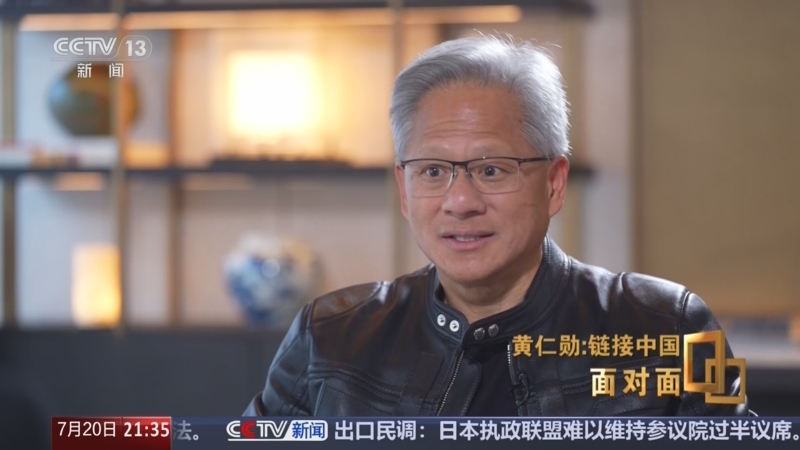On the evening of July 20, NVIDIA CEO Jensen Huang appeared on China Central Television's (CCTV) flagship interview program Face to Face, where he praised Chinese AI firms—including DeepSeek and Huawei—and emphasized that China's AI development will continue with or without NVIDIA.
Huang's comments followed his attendance at the third China International Supply Chain Expo (CISCE) in Beijing, where he delivered a speech at the opening ceremony in Mandarin while wearing traditional Chinese attire. "If I gave the whole speech in Chinese, it would take 30 minutes—I was too nervous," he explained.
During the interview, Huang underscored China's significance in the global supply chain, calling it "one of the most sophisticated and diverse systems in the world." He noted that NVIDIA collaborates with up to 200 technical partners globally to build its AI supercomputers, making supply chain integration a critical part of the company's operations.
NVIDIA made its first appearance at CISCE this year, showcasing AI solutions including robotics simulation, digital twins, and big data learning, with over 100 technical staff present. Huang noted that this marked his third visit to China in 2025, saying he felt "genuinely welcomed" by partners and customers in the country.

One key topic was the U.S.-approved H20 chip, a China-specific AI accelerator launched by NVIDIA. While it offers reduced performance compared to the flagship H100, Huang emphasized that Chinese companies have adapted creatively. "DeepSeek, for example, developed the R1 model that fully leverages the H20 architecture. It's truly innovative," he said.
Despite export restrictions, Huang remains confident in China's innovation capabilities: "Innovation here cannot be stopped. Even if NVIDIA isn't present, companies like Huawei will drive progress." He praised Huawei as a "formidable company—larger, broader, and deeper than us," and added that their advancements in autonomous driving and chip design are "worthy of admiration."

On the future of U.S.-China tech collaboration, Huang reiterated his long-standing stance: "China is not just another market—it's a unique ecosystem of energy, innovation, and scale. Not participating carries risks that we cannot ignore."
Asked about Huawei being a rival or partner, Huang responded: "They're a competitor, but also a company we deeply admire. Competitors are not enemies."
He also spoke fondly of his long-term collaboration with Xiaomi's Lei Jun, sharing that their partnership has evolved from smartphones to AI and autonomous driving. "China has some of the world's best computer scientists and engineers. The sheer scale of the market and its talent pool is unmatched."
In a separate fireside chat at CISCE, Huang discussed the convergence of AI and robotics with Alibaba Cloud founder Wang Jian. He noted that China is leading in autonomous vehicles, citing companies like XPeng, Li Auto, NIO, Xiaomi, and BYD. "China's ability to integrate AI, software, and mechanical systems is extraordinary—it's a tremendous opportunity."
Today, NVIDIA employs nearly 4,000 people in China and operates AI innovation centers in Shanghai and Beijing. Huang highlighted the company's long history in China, dating back 30 years to partnerships with Lenovo and Great Wall. He listed key Chinese collaborators including Alibaba, Tencent, Baidu, Meituan, and BYD.
While Huang's leadership has transformed NVIDIA from a gaming GPU firm into the world's most valuable chip company—with a market cap that briefly topped $4 trillion in July—he says he's still on edge. "At every company meeting, I remind everyone: we're 30 days away from bankruptcy." Despite this intensity, Huang plans to work well into his 80s, driven by passion and a belief in open, candid leadership.
In closing, he stressed again: "AI is too important. The world is big enough for all of us—and we should compete, collaborate, and move forward together."
+86 191 9627 2716
+86 181 7379 0595
8:30 a.m. to 5:30 p.m., Monday to Friday
